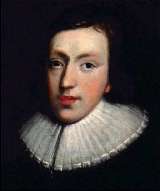
Born: December 9, 1608, in London, England
Died: November 8, 1674, in London, England
John Milton is considered by some the greatest English writer after Shakespeare. He worked during the transition between the Elizabethan and Jacobite periods.
He was one of three children born to his father, also named John Milton. His father was a scrivener, an amateur musician, and a composer. He was born in his father's shop on Bread Street.
Milton was educated at St. Paul's School and Christ's College, Cambridge. He was eager to learn and quickly gained a reputation as a scholar. He was not popular among his schoolmates, who nicknamed him the Lady of Christ's for his feminine face and precise conduct. He wrote Latin and English poems at Cambridge including On the Morning of Christ's Nativity. Milton's father had planned for his son to study for the clergy, but because of Milton's interest in writing and his awareness of existing family dissention over religious beliefs, he didn't follow this path.
Following his graduation with a master of arts in 1632, Milton spent several years living with his parents. During this time, he attacked the clergy in Lycidas and met Galileo while traveling through Italy. In 1643, he married Mary Powell. They separated within a few weeks, but reconciled years later. Together, they had three children before Powell's death in 1652. Several essays resulted from his marital problems, including The Doctrine And Discipline Of Divorce.
Milton was actively involved in the government. He wrote propaganda pieces against King Charles I and became a translator of diplomatic correspondence for Oliver Cromwell. He married Katherine Woodcock in 1656 and, after Katherine's death, Elizabeth Minshull in 1663.
He became blind later in his career, but this did not stop him from writing the epic poem, Paradise Lost, which was published in 1667. This is considered the greatest epic poem in modern literature. The work was influenced by the writings of Homer and Virgil and borrowed mythical figures such as Prometheus.
For two hundred years, Paradise Lost was considered a comprehensive theological interpretation of the bible. Today, it is used as the best poetic synthesis of Christianity. Milton followed this work with two similar poems: Paradise Regained and Samson Agonistes.
Milton died of gout and was buried beside his father in St. Giles, Cripplegate.